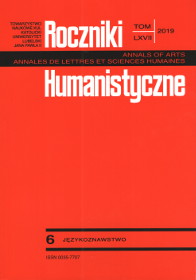Izokrates na temat etycznej wartości przekazu retorycznego
Abstrakt
Przedmiotem artykułu jest teoria etycznej retoryki Izokratesa, słusznie uważanego za prekursora idei etyki komunikacji lingwistycznej. Autor artykułu koncentruje się na następujących aspektach zagadnienia: kwestii prawdy i odpowiedzialności za słowo, etycznym postępowaniu retora, jego zaangażowaniu politycznym, sympatii do innych ludzi, własnej nieustającej aktywności umysłowej i wreszcie jego trosce o stylistyczną i eufoniczną jakość przekazu. Ostatnie uwagi dotyczą problemu, czy Izokrates rzeczywiście przestrzegał zasad retorycznych, które głosił.
Bibliografia
Behme T.: Isocrates on the Ethics of Authorship, „Rhetoric Review” 23(2004), 3, s.197-215.
Chase K.R.: Constructing Ethics through Rhetoric: Isocrates and Piety, „Quarterly Journal of Speech” 95(2009), No. 3, s. 239-262.
Eucken Ch.: Isokrates. Seine Positionen in der Auseinandersetzung mit den zeitgenössischen Philosophen, Berlin 1983.
Garver E.: Philosophy, Rhetoric, and Civic Education in Aristotle and Isocrates; w: Isocrates and Civic Education, red. T. Poulakos, D. Depew, Austin: University of Texas Press 2004, s. 186-213.
Haskins E.: Logos and Power in Sophistical and Isocratean Rhetoric, w: Isocrates and Civic Education, red. T. Poulakos, D. Depew, Austin: University of Texas Press 2004, s. 84-103.
Janik J.: Izokrates − pisarz czy mówca? Kilka uwag o kompozycji „Panegiryku”. „Quaestiones Oralitatis” 2(2016), nr 1, s. 55-74.
Marsh Ch.W.: Public Relations Ethics: Contrasting Models from the Rhetorics of Plato, Aristotle, and Isocrates, „Journal of Mass Media Ethics” 16(2001), 2-3, s. 78-98.
Marsh Ch.: Millennia of discord: The controversial educational program of Isocrates, „Theory and Research in Education” 8(2010), 3.
Mathiesen A.: Edukacja retoryczna jako element kształtowania mądrości politycznej, „Ethics in Progress” 7(2016), 2, s. 58-81.
Morgan K.: The Education of Athens: Politics and Rhetoric in Isocrates, w: Isocrates and Civic Education, red. T. Poulakos, D. Depew, Austin: University of Texas Press 2004, s.125-154.
Poulakos J.: Rhetoric and Civic Education: from the Sophists to Isocrates, w: Isocrates and Civic Education, red. T. Poulakos, D. Depew, Austin: University of Texas Press 2004, s.69-83.
Poulakos T.: Speaking for the Polis. Isocrates' Rhetorical Education, Columbia: University of South Carolina Press 1997.
Romilly de J.: Eunoia in Isocrates or the Political Importance of Creating Good Will, „The Journal of Hellenic Studies” 78(1958), s. 92-101.
Tesauro E.: Idea wymowy opartej na argucji i pełnej finezji, w przekładzie i opracowaniu Iwony Słomak i Kacpra Kardasa, TERMINUS 17(2015), z. 2, s.379-416.
Walters F.D.: Isocrates and the Epistemic Return: Individual and Community in Classical and Modern Rhetoric, „Journal of Advanced Composition” 13(1993), s.155-172.
Wareh T.: The Theory and Practice of Life. Isocrates and the Philosophers, Cambridge: Harvard University Press 2012.
Wesoły M.: Skąd się wzięła retoryka? Perspektywa Arystotelesa, w: Retoryka klasyczna iretoryka współczesna. Pola i perspektywy badań, red. C. Mielczarski, Warszawa: Wydawnictwo Naukowe Sup Lupa 2017, s. 13-49.
Yun Lee Too: The Rhetoric of Identity in Isocrates, Cambridge: Cambridge University Press 2009 (first publ. 1995).
Copyright (c) 2019 Roczniki Humanistyczne

Utwór dostępny jest na licencji Creative Commons Uznanie autorstwa – Użycie niekomercyjne – Bez utworów zależnych 4.0 Międzynarodowe.





